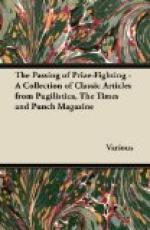Wednesday, March 5th.—The friends of the new LORD CHANCELLOR were becoming anxious lest his natural gaiety should be permanently suppressed by the necessity of keeping up the dignity of the Woolsack. They need be under no further apprehensions. A motion in favour of Home Rule All Round, introduced by Lord BRASSEY and supported by Lord SELBORNE, furnished him with his chance. Metaphorically flinging his full-bottomed wig on to the floor he skipped into the arena, executed a war-dance around his amazed victims, and, before they knew where they were, got their heads into Chancery and knocked them together until they were compelled to give in. Talk of the congestion of Parliament! Why, now that party spirit was in abeyance, Bills went through with incredible rapidity. As for the supposed ambitions of the “little nations,” what, he asked, did Scotsmen and Welshmen care about subordinate Parliaments when they were governing the whole Empire? If the advocates of the proposal really believed in it let them go out as missionaries into the wilderness, and, if they escaped the proverbial fate of missionaries, convert the heathen voters to their creed. Thereupon Lord BRASSEY, his brow bloody but unbowed, intimated that “a time would come,” and meanwhile withdrew his motion.
At Question-time Mr. BONAR LAW indignantly denied a newspaper rumour from Paris that the British delegates had decided not to demand any money-indemnity from Germany, but took occasion later on to discount somewhat freely the election-promises made on this subject by himself and other Ministers. It would be better, he implied, to accept a composition than to put the debtor into the Bankruptcy Court. This is common sense, no doubt, always provided that the Hun does not misinterpret his reprieve, and, instead of laying golden eggs for our benefit, resume the practice of the goose-step.
On the Civil Service Estimates, swollen to five times their pre-war magnitude, Mr. BALDWIN made an earnest appeal for economy. If every man would ask himself, “What can I do for the State?” instead of “What can I get out of it?” we might yet emerge safely from our financial straits. The House, as usual, cheered this fine sentiment to the echo, and, to show how thoroughly it had gone home, Mr. ADAMSON, the Labour leader, immediately pressed for an increase in the salaries of Members of Parliament.
Thursday, March 6th.—The CHIEF SECRETARY FOR IRELAND announced that the Government had decided to release such of the Sinn Fein prisoners as had not already saved them the trouble.
History does not always repeat itself. The first JOSIAH WEDGWOOD enhanced his fame by a faithful reproduction of the Portland Vase. JOSIAH the Second, essaying a fancy portrait of the present Duke of PORTLAND (in his capacity of a coal-owner), was less fortunate in the likeness, and this afternoon handsomely withdrew it from circulation.




